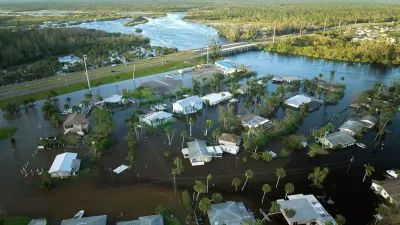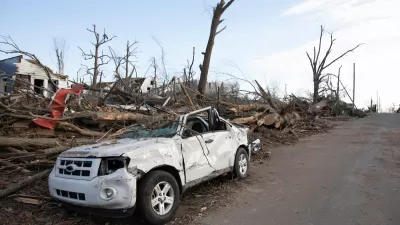Sandy has displaced thousands of families, while leaving many without hot water or heat. Officials are concerned cold temperatures will increase the number of families seeking shelter, and are asking NYC landlords to help house them in vacant units.
"You really need to help out," Shaun Donovan, the federal Secretary of Housing and Urban Development, told real estate executives in Manhattan last week. The meeting was a first step towards "a White House rebuilding program that President Obama is expected to announce on Thursday in Manhattan for New York, New Jersey and possibly Connecticut," adds Charles V. Bagli. Members of the Real Estate Board of New York, the Rent Stabilization Association and the New York Association for Affordable Housing also met with officials to discuss the possibility of a public-private partnership to help families displaced by Sandy.
The Federal Emergency Management Agency (FEMA) currently provides a monthly rental assistance of $1,800 for up to 18 months. Officials and landlords have discussed "a system by which people who apply to the Federal Emergency Management Agency for housing could be matched with landlords who have vacant apartments," writes Bagli. "The tenants would pay rent directly with a FEMA voucher, or obtain an apartment through an agency like the Red Cross." However, there is concern that assistance from FEMA may only be enough to cover units in Brooklyn and Queens, not Manhattan.
While landlords are open to lending assistance, Bagli notes, they have "raised a series of statutory and legal hurdles that would have to be overcome." These include provisions for short-term tenants and indemnification for apartment damages and forced eviction. "'People want to do the right thing,' said Charles Dorego, senior vice president of Glenwood Management, a major Manhattan landlord, who attended the meetings on behalf of the Real Estate Board. 'But they don't want to inherit a pig in a poke.'"
FULL STORY: U.S. Asks New York Landlords for Vacant Apartments to House Displaced Families

Maui's Vacation Rental Debate Turns Ugly
Verbal attacks, misinformation campaigns and fistfights plague a high-stakes debate to convert thousands of vacation rentals into long-term housing.

Planetizen Federal Action Tracker
A weekly monitor of how Trump’s orders and actions are impacting planners and planning in America.

Chicago’s Ghost Rails
Just beneath the surface of the modern city lie the remnants of its expansive early 20th-century streetcar system.

Bend, Oregon Zoning Reforms Prioritize Small-Scale Housing
The city altered its zoning code to allow multi-family housing and eliminated parking mandates citywide.

Amtrak Cutting Jobs, Funding to High-Speed Rail
The agency plans to cut 10 percent of its workforce and has confirmed it will not fund new high-speed rail projects.

LA Denies Basic Services to Unhoused Residents
The city has repeatedly failed to respond to requests for trash pickup at encampment sites, and eliminated a program that provided mobile showers and toilets.
Urban Design for Planners 1: Software Tools
This six-course series explores essential urban design concepts using open source software and equips planners with the tools they need to participate fully in the urban design process.
Planning for Universal Design
Learn the tools for implementing Universal Design in planning regulations.
planning NEXT
Appalachian Highlands Housing Partners
Mpact (founded as Rail~Volution)
City of Camden Redevelopment Agency
City of Astoria
City of Portland
City of Laramie





























